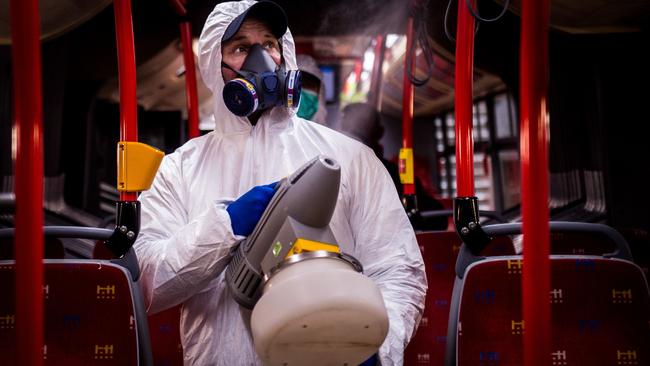What coronavirus means for gig economy workers
Beyond its impact upon our health and toilet paper supplies, COVID-19 also has the potential to change the way we operate and look after our growing casual workforce, writes Steve Sammartino.

Rendezview
Don't miss out on the headlines from Rendezview. Followed categories will be added to My News.
Initially the coronavirus sounded like something suffered on a Sunday morning after visiting one too many of Mexico’s favourite beers.
Today, with thousands of deaths around the world it is driving Aussies crazy with fear leading to no toilet or tissue paper on the shelves.
Why the rush for toilet paper is the question asked by many, when food would seem more of a priority if you were to be housebound for an extended period.
Humans can be strange creatures and under stress, pressure and panic can make some strange decisions.
Beyond its impact upon our health, toilet paper supplies and the need for us to develop a new skill of ‘social distancing,’ COVID-19 virus also has the potential to change the way we work.
Overseas we have seen cities closed, people movement banned with tens of thousands asked to self-isolate themselves to prevent the spread of the virus.
What is becoming increasingly clear is that Australia is likely to experience some level of this disruption, with schools already closing and it is only a matter of time before businesses begin to close due to a staff member contracting the illness.

In this new world, no longer will the brave worker who soldiers on regardless of illness be the model employee, instead those who stay away at the first sign of illness will be those applauded for putting the business first.
The great threat to our businesses in the world of the coronavirus is the casualisation of our workforce, with the pressure of not being paid due to illness driving people to front up to work, putting everyone’s health at risk, due to the need to meet their financial commitments.
In the US, they have identified non-paid leave as such a threat that they are now talking of measures of the government picking up the tab and with over 100 million workers around being classified as part of this ‘gig’ economy, it’s time we got innovative to improve the rights of these workers.
The ‘gig’ economy is not a short-term aberration, but a long-term shift growing at more than 30 per cent every year with the latest ABS data showing that 30 per cent of adults participated in freelance work this month, with predictions that by 2027 there will be more independent workers than PAYG wage earners in Australia.
It is likely that the requirement to close factories and centralised workplaces will hasten this pace of change to minimise such threats in the future, with businesses embracing the technology that will see an ‘employee’ able to work from any corner of the world.
Consider, the technology in our homes is as good as any office. Most forms of information work can be done anywhere, with NASA-powered computers in our pockets.

Where there is adversity, there is always opportunity and if millions are forced to work from home, through this technology we may see change driven which provides the workplace flexibility the modern worker has been seeking.
Disparate labour can be organised around the world too, in real time and events such as COVID-19 will hasten a future in which most people won’t be employees, but ‘digital craftspeople’ who hire their time to one, or many organisations.
I’ll go as far to predict that within 50 years we’ll see global multibillion-dollar corporations with exactly zero employees, all their work performed by independent contractors – Uber on steroids. This will happen not only because it’s logistically possible, but because it provides scalable flexibility and will be far more profitable.
With the benefits also comes some serious headaches for government, with the rights that workers fought hard for over decades, such as safe workplaces and fair remuneration under this new ‘gig’ economy potentially being eviscerated.
Annual leave, sick leave, training, OH&S standards and superannuation shifting to become the responsibility of the worker.

What we need now is a new kind of ‘gig’ worker benefit scheme akin to superannuation. This benefit scheme would provide a form of security for ‘gig’ economy workers.
For example, a simple percentage loading on labour fees could fund annual leave, sick leave, superannuation etc. for ‘gig’ workers, paid for by the firms hiring them.
This way workers who currently forego these benefits many of us take for granted can maintain their living standards and dignity while they are making their economic contribution.
The fund would need to be in the worker’s name and ported wherever they perform ‘gig’ labour. If we managed to pass such a law, our economy would be better placed to cope with the long-term shift to independent labour gigs, remain flexible and better placed to cope with periodic shocks to the economy that the coronavirus has exposed.
A smart government will implement such a policy and lead the world in inventing an entirely new industry. We have done this before in Australia with the creation of the superannuation industry, today valued at $2.7 trillion and if we are first to set up this kind of a policy structure, we could export the financial management model of ‘gig’ support the world over.
If there’s anything we need in our economy, it is regulatory innovation to match the rapidly changing technology driven labour market.
Steve Sammartino is a Futurist and Business Technology expert


